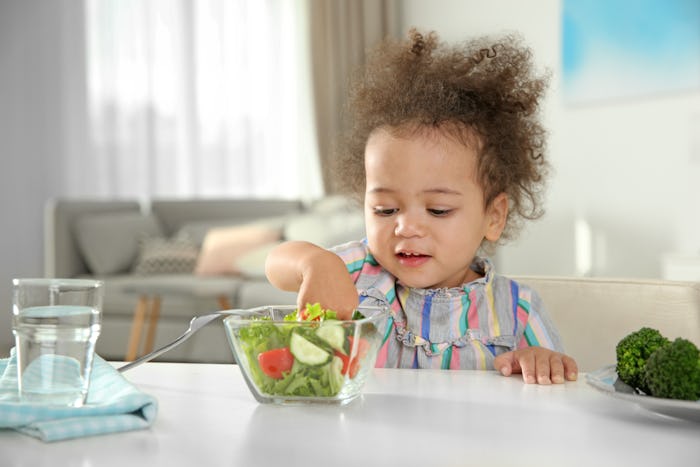Picky toddlers are the worst. I can't even count the number of times I have cooked a perfectly delicious meal only to have a toddler throw it entirely on the floor in protest. My kids are a bit older now, but when they were younger, I never knew if there were signs my toddler needed to eat more vegetables, or if they were getting the proper nutrition they needed from the copious amounts of chicken nuggets and chocolate milk they were demanding around the clock.
Dr. Betsy Marks, a pediatrician and internist practicing in Albany, NY, has experienced this very phenomenon. As a pediatrician, she also has the scoop on what is recommended for toddlers. "With few exceptions, all toddlers need to eat more vegetables. The American Academy of Pediatrics recommends that there should be vegetable consumption with every meal and snack, and let me tell you, as the mother of three, this feels like an impossible ask," she tells Romper.
"There are some ways to come closer to this goal, however. And some parents may say 'my kid tried it and doesn't like it.' A child often has to be offered a food 10 times before they will even try it and another 10 times before they decide they like it," Dr. Marks explains.
But how do parents know if their toddler needs to eat more vegetables? Looking for the following signs can be the first clue, but it is always great to check with your child's doctor to know for sure.
1
Your Toddler Is Constipated
Olivia Munger, pediatric clinical dietitian, R.D., L.D., at Children’s National Health System told me that paying attention to your toddler's bathroom habits is one way to tell if a toddler is not consuming enough vegetables in their diet. "Fruits and vegetables are a great source of fiber, so if your child isn’t getting enough, they could experience constipation," she says. "Fruits and vegetables provide a wide variety of vitamin and minerals that children need for proper development. Fiber from fruits and vegetables also helps prevent constipation."
Munger's main advice for parents struggling with toddlers and vegetable consumption is practice what we preach and be persistent. "Be a good role model! Children need to see their parents eating and enjoying fruits and vegetables," she says. "Most importantly, don’t give up!"
2
Your Toddler Bruises Or Bleeds Easily
Toddlers will be toddlers. They're still learning about the world around them, and during their exploration they're likely to get a few bumps and bruises. But if you notice your toddler's scrapes bleeding more than they should, it may be a sign that they aren't eating plenty of vegetables. "Green leafy vegetables like broccoli and kale contain vitamin K which aids in blood clotting when toddlers get cuts and scratches," Angie Weiss, Nutrition Services Director at the Witchita Falls Food Bank in Texas, explains to Romper.
If your toddler doesn't particularly love munching on spinach, Weiss shares some tips to help get kids to try new vegetables. "Cut food up and let them create shapes, silly faces, patterns, designs on their plate, then eat it," she says. "Or create a scavenger hunt and hide vegetables in your house, then have them find it. After they find it, they get to try it."
3
They Experience Vision Issues
"Carrots are part of the yellow/orange color group and contain vitamin A for eyesight and skin," Weiss says. If a toddler is not consuming enough of these types of vegetables, they may start to experience problems with their eyesight. According to the National Institute of Health, toddlers ages 1 to 3 should be consuming about 1,200 IU of vitamin A daily for optimal health. Early screenings by pediatricians and schools typically catch vision problems before they become a hinderance, but a diet rich in vegetables like carrots and sweet potatoes can help promote eye health.
4
Your Toddler Has A Vitamin Deficiency
Knowing that a toddler has a vitamin deficiency might require a trip to the pediatrician and a blood test (ouch!) but, it gives parents important information regarding the health of their child. "Deficiencies may occur when we don’t get enough nutrients. All signs and symptoms are very different," Weiss explains. To combat this problem before it even begins, she suggests toddlers eat a diet with a variety of vegetables. "The best thing to do is eat a rainbow. Eating a rainbow of vegetables helps toddlers get all of their needed vitamins."
5
Your Toddler Is Extra Cranky
Toddlers can be cranky for all sorts of reasons. But if you notice your little one becoming extra moody, it may be time to re-think their vegetable intake. According to a Harvard Medical School resource for parents, there are many reasons why kids may be upset, but improper nutrition can lead to irritability.
Feeding vegetables to an angry toddler is not easy, but Dr. Marks shares advice to help combat vegetable consumption challenges. "Kids respond to fun and to being involved, so using those tools can work to get them to eat better as well. Involve them in grocery shopping and in meal prep when possible," she says. "Talking about how vegetables grow or even having your own small garden can help. Cutting or organizing vegetables into fun shapes can make mealtime more playful. Dipping veggies in hummus, salad dressing, or drizzling them with cheese can help. And for the most stubborn of the toddler set, there is no shame in hiding veggies in a sauce, smoothie or 'green' cupcake or muffin."
